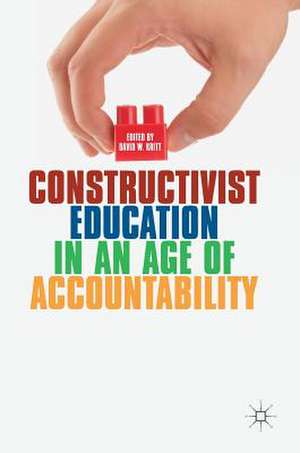Constructivist Education in an Age of Accountability
Editat de David W. Kritten Limba Engleză Hardback – 30 ian 2018
This book contrasts authentic approaches to education with classroom practices based primarily on standards external to the individuals who are supposed to learn. While other books tend to promote either a desperate scramble for meeting standards or determined resistance to neoliberal reforms, this book fills that gap in ways that will inspire practitioners, prospective teachers, and teacher educators. Mandates pay only lip service to constructivist and social constructivist principles while thwarting the value of both students and teachers actively creating understandings. Authors in this book assert the central importance of a range of constructivist approaches to teaching, learning, and thinking, inviting careful reflection on the goals and values of education.
| Toate formatele și edițiile | Preț | Express |
|---|---|---|
| Paperback (1) | 237.76 lei 6-8 săpt. | |
| Springer International Publishing – 3 iun 2019 | 237.76 lei 6-8 săpt. | |
| Hardback (1) | 646.62 lei 6-8 săpt. | |
| Springer International Publishing – 30 ian 2018 | 646.62 lei 6-8 săpt. |
Preț: 646.62 lei
Preț vechi: 760.73 lei
-15% Nou
Puncte Express: 970
Preț estimativ în valută:
123.75€ • 128.72$ • 102.16£
123.75€ • 128.72$ • 102.16£
Carte tipărită la comandă
Livrare economică 14-28 aprilie
Preluare comenzi: 021 569.72.76
Specificații
ISBN-13: 9783319660493
ISBN-10: 3319660497
Pagini: 356
Ilustrații: XV, 351 p. 4 illus.
Dimensiuni: 148 x 210 x 26 mm
Greutate: 0.59 kg
Ediția:1st ed. 2018
Editura: Springer International Publishing
Colecția Palgrave Macmillan
Locul publicării:Cham, Switzerland
ISBN-10: 3319660497
Pagini: 356
Ilustrații: XV, 351 p. 4 illus.
Dimensiuni: 148 x 210 x 26 mm
Greutate: 0.59 kg
Ediția:1st ed. 2018
Editura: Springer International Publishing
Colecția Palgrave Macmillan
Locul publicării:Cham, Switzerland
Cuprins
Section I: Introduction
1. Teaching as if children matter
2. The place for Dewey’s constructivism of intelligent action in the American meritocracy of Thorndike
3. The Confucian concept of learning
Section II: Engaged Learning for Understanding: STEM Education
4. Pedagogic doublethink: Scientific enquiry and the construction of personal knowledge under the English National Curriculum for science
5. The practice turn in learning theory and in science education
6. How constructivism can boost success in STEM fields for women and minorities
Section III: Other Literacies
7. Reconceptualizing accountability: The ethical importance of expanding understandings of literacy and assessment for 21st century learners
8. Where DAP is due: Constructing community across difference with the Dialogue Arts Project
9. A constructing perspective on games in Education
Section IV: Social Studies and Social Life
10. Social studies, Common Core, and the threat to constructivist education
11. Toward a resolution for teacher-student conflict: Crafting spaces of rigorous freedom with classroom debate
12. Activity settings as context for motivation: Reframing classroom motivation as dilemmas within and between activities
13. Expeditionary learning, constructivism, and the emotional risks of open-ended inquiry
Section V: Implications for the future of public education
14. Learning, teaching, and social justice: Eleanor Duckworth’s perspective
15. How documentation of practice contributes to construction and reconstruction of an understanding of learning and teaching
16. Reimagining research and practice in education
17. School learning as compliance or creation
Notă biografică
David W. Kritt is Associate Professor of Education at the College of Staten Island, City University of New York, USA.
Textul de pe ultima copertă
This book contrasts authentic approaches to education with classroom practices based primarily on standards external to the individuals who are supposed to learn. While other books tend to promote either a desperate scramble for meeting standards or determined resistance to neoliberal reforms, this book fills that gap in ways that will inspire practitioners, prospective teachers, and teacher educators. Mandates pay only lip service to constructivist and social constructivist principles while thwarting the value of both students and teachers actively creating understandings. Authors in this book assert the central importance of a range of constructivist approaches to teaching, learning, and thinking, inviting careful reflection on the goals and values of education.
Caracteristici
Includes constructivist education approaches rooted in action, activity, interaction, discourse, inquiry, and learning originating from culture and individual experience
Examines the competing demands of accountability and meaningful, engaged learning in the classroom
Considers educational reforms of recent years to set a context for juxtaposing cognitive theory of learning-teaching and educational politics as they affect teacher education and classroom practices
Examines the competing demands of accountability and meaningful, engaged learning in the classroom
Considers educational reforms of recent years to set a context for juxtaposing cognitive theory of learning-teaching and educational politics as they affect teacher education and classroom practices
